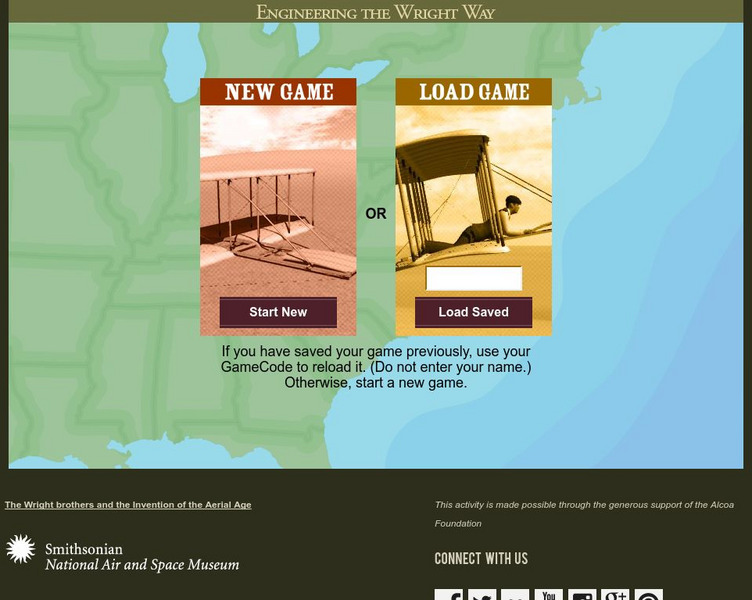Hi, what do you want to do?
Curated OER
Untitled Document Aerospace Team Online:
Students explain the historical significance of use of the scientific method in developing the first airplane and appreciate the process involved in developing a new technology.
Curated OER
The Wrights' Flight: History Through Primary Sources
Students read primary source material about the Wrights' first flight such as a journal and a telegram. For this The Wrights' Flight lesson, students select the most reliable primary source and compare the pros and cons of using primary...
Curated OER
The "Wright" Puzzle
In this airplane instructional activity, students complete a crossword puzzle by figuring out the answers to 12 questions about the flying machines created by the Wright Brothers.
Curated OER
Flying With The Wright Stuff
Students explore the history of flight, specifically the Wright brothers. Pupils create paper airplanes. They discuss considerations in building an aircraft such as drag, thrust, and weight. Classmates compare the Wright Brother's...
Curated OER
Stories of the Wrights' Flight
Students examine and compare primary and secondary source accounts of the Wright brothers' first flights on December 17, 1903.
Curated OER
Celebrating A Century of Flight
Learners investigate the Wright Brothers. They complete an online Webquest, explore various websites, use a flight simulator, answer discussion questions, and locate newspaper articles on the 100th anniversary of the Wright brothers'...
Curated OER
Flying with Fractions
Students test their knowledge of the Wright Brothers and their aircraft, and compute ratio of two numbers to determine the ratio between wing span and length of aircraft.
Curated OER
Aviation Pioneers
Young scholars research the Wright Brothers historic first flight and design a travel poster asking for volunteers to participate. Write a newspaper account of the first flight and include how the local people may have felt about the...
Curated OER
National Park Service: Dayton Aviation National Historical Site
Official website of the Dayton Aviation National Historic Park. Historic landmarks tell the stories of the lives of the Wright Brothers and Paul Laurence Dunbar.
Science Museum, London
Science Museum Online Stuff: The First Flight
An excellent article about how Orville and Wilbur Wright's interest in flight developed and led to the first airplane flight.
Smithsonian Institution
Smithsonian Learning Lab: How Things Fly: Activities for Teaching Flight
Through this series of three lessons, students will gain an understanding of the basics of flight. They will learn about the four forces of flight and practice their observation skills through a number of fun experiments. In addition,...
Library of Congress
Loc: The Dream of Flight
The Library of Congress has opened its vast resources and created an exhibition commemorating the centennial of flight. The library uses "some of its rarest and most significant materials," to present this aviation history exhibit. Be...
Library of Congress
Loc: The Dream of Flight
The Library of Congress has opened its vast resources and created an exhibition commemorating the centennial of flight. The Library uses "Some of its rarest and most significant materials," to present this beautiful website. Be sure to...
Other
Wright Brothers Aeroplane Co.: The Wright Story
A detailed look at the lives of Orville and Wilbur Wright, offering an overview of their childhood and career choices, their invention of the airplane, and the development and challenges of the airplane business. Provides embedded links...
Other
Wright Brothers Aeroplane Co.: Aviation's Attic
Explore this virtual museum and learn the history of the Wright brothers and their determination to fly.
NASA
Nasa: Re Living the Wright Way
Learn about the many inventions credited to Orville and Wilbur Wright! Lesson plans, activities, simulations, individual biographies, and links to related sites are all included in this expansive site from NASA.
Smithsonian Institution
National Air and Space Museum: Wright Brothers: The Invention of the Aerial Age
Beautiful, well-done site from the Smithsonian on the Wright Brothers: Who were they and what was the importance of the era they ushered in? Their roots are traced back to the Great Migration. Classroom activities and interactive...
Smithsonian Institution
National Air and Space Museum: Wright Brothers: Interactive Experiments
Three interactives in an online exhibition about the Wright Brothers. The first is an engineering activity on the forces of flight, and is accompanied by a lesson plan for Grades 6-8. The second is a gallery of original artifacts related...
Smithsonian Institution
National Air and Space Museum: Wright Brothers: Engineering the Wright Way
Great interactive provides students with an opportunity to use engineering skills to design and test airplane wings based on the methods of the Wright brothers. Step into the workshop and design a set of wings that will fly your glider...
Smithsonian Institution
National Air and Space Museum: Wright Brothers: Who Were Wilbur and Orville?
Classroom activities, interactive experiments, timelines, and other artifacts that celebrate the Wright brothers' first flight.
The Henry Ford
Henry Ford Museum & Greenfield Village: Wright Brothers
Biographical information on the Wright Brothers, including their childhoods, the Wright Cycle Shop, the world's first airplane, a chronology, and links to more information.
PBS
Wnet: Thirteen: Freedom: A History of the u.s. Safe for Democracy Webisode 11
Webisode 11 - Safety for Democracy. The history of the United States is presented in a series of webisodes, within each are a number of segments.Included are links to lesson plans, teacher guides, resources, activities, and tools.
Houghton Mifflin Harcourt
Harcourt: Biographies: Orville & Wilbur Wright
Brief biography on Orville and Wilbur Wright. Read how the Wright brothers' work with bikes, kites, and gliders led to human flight.
Smithsonian Institution
Smithsonian Learning Lab: Stories of the Wrights' Flights
This lesson plan has young scholars read primary materials from the Smithsonian collection written by the Wright brothers, and compare and contrast them to secondary sources, such as newspaper stories from the next day. There is...


























